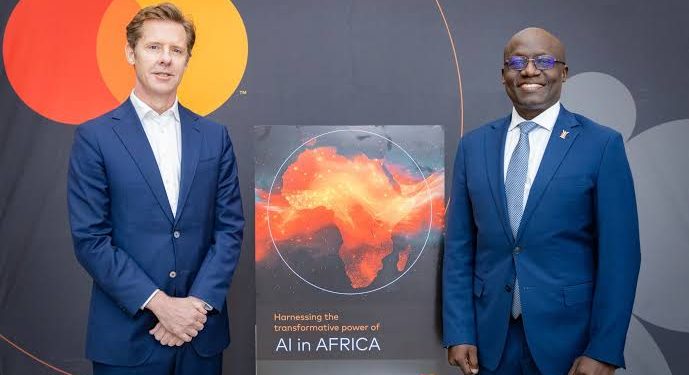Mastercard has released a new whitepaper, Harnessing the Transformative Power of AI in Africa, outlining how artificial intelligence could drive financial inclusion, job creation, and innovation across the continent.
The study highlights insights from Kenya, South Africa, Nigeria, and Morocco, showing AI’s potential to reshape industries such as agriculture, healthcare, education, energy, and finance. With Africa’s AI market projected to expand from $4.5 billion in 2025 to $16.5 billion by 2030, Mastercard calls for stronger collaboration between governments, businesses, and regulators.
Mark Elliott, division president for Africa at Mastercard, said: “Africa’s engagement with AI is already reshaping lives — not just in labs, but in farms, clinics and classrooms. To unlock its full potential, we need investment in infrastructure, data, talent, and policy.”
The paper stresses that up to 230 million digital jobs could be created in Sub-Saharan Africa by 2030, provided challenges around infrastructure, talent, and regulation are addressed. It also points to opportunities in AI-enabled credit scoring, fraud prevention, and local language processing.
Greg Ulrich, Mastercard’s chief AI and data officer, added: “AI is only as powerful as the trust behind it. At Mastercard, we’re committed to building AI that’s responsible, inclusive, and built to bring value to our customers, partners and employees.”
Regional Highlights
South Africa: Attracted $610 million in AI-focused venture capital in 2023, with total AI investment expected to hit $3.7 billion by 2030. The Artificial Intelligence Institute of South Africa is driving research and training, with national plans to develop 300 startups and 5,000 AI professionals by 2030.
Kenya: Known as the “Silicon Savannah,” Kenya is applying AI across health and finance, from Jacaranda Health’s maternal health chatbot to Tala’s mobile-based credit scoring. Its new National AI Strategy (2025–2030) aims to position the country as a regional leader.
Nigeria: Ranked second in Africa for AI startups, Nigeria secured $218 million in venture funding in 2023. AI tools are being used in education, microfinance, and governance, with the market projected to reach $1.4 billion by 2025.
Morocco: Advancing AI in healthcare, energy, and agriculture, with institutions like Mohammed VI Polytechnic University and events such as the MoroccoAI Conference driving adoption. The Digital 2030 plan targets $1.1 billion in investment and 240,000 new digital jobs.
Despite progress, Mastercard warns that data fragmentation, regulatory inconsistencies, and language exclusion could widen the digital divide.
The whitepaper draws on input from UNESCO, the African Center for Economic Transformation, and fintech leaders, underscoring that strategic partnerships will be essential to ensuring AI adoption drives inclusive growth across Africa.
To download the full whitepaper, click mastercard-ai-in-africa-2025.pdf.
























































